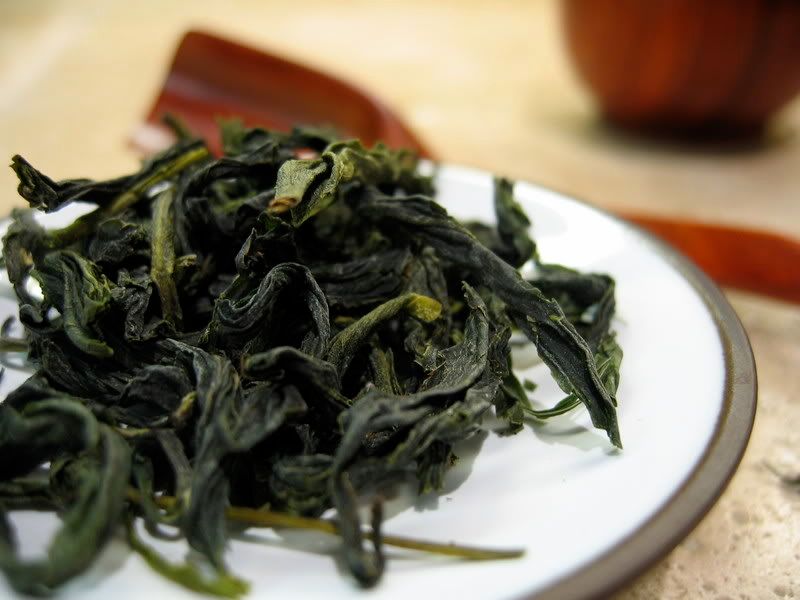Origin: Pin-Lin, Taipei, Taiwan
Year: 2007
Vendor: Hou De Fine Tea
Price: $17.50 (2 oz) / $29.75 (4 oz)
Verdict: 7.5/10
I had originally planned on doing a side-by-side comparison of this baozhong and the 1980's aged baozhong I wrote about in my previous post, but I soon discovered that these two teas share virtually nothing in common. This is not to say that one was good and one was bad, just that the time and roastings resulted in a remarkable change.
Guang shares a nice story about the farmer, Mr. Wang Yiu-Li, and I highly recommend reading it. I have to say, I was quite impressed by the first two infusions, though the flavor did drop off pretty rapidly after that. Guang writes that he only got 4 good infusions, and I had a similar experience. It *might* be possible to get a good 5th brew, but I doubt it.
 Dry Leaf:
Dry Leaf:Long, twisted, emerald green leaves. Not entirely aromatic, but enough to remind me of springtime and freshly-cut grass. It seems that this tea is focused more on flavor than aroma, which is an oddity among Taiwanese oolongs, from what I have heard.
Parameters:
4.5g leaf; 90-100mL preheated zisha gaiwan; 190°F freshly drawn tap water; 15s, 20s, 30s, 35s, 45s
 Liquor:
Liquor:The first two infusions were absolutely lovely-- it is a shame this tea didn't have more endurance. The liquor has a smooth, milky flavor, with a haunting floral aftertaste. Yes, I know, milky and floral flavors may not seem like they would agree with each other, but this is the exception to the rule (if there is such a rule). Though light in color (the infusion pictured is the first, so it is understandably light), this tea had a very nice, thick, tongue-coating feel. Appropriately, considering the milky flavor, this was a creamy thickness, as opposed to an oily or "umami" kind of richness. The harmony is actually quite impressive-- it is as though the flavors and sensations were expertly selected and blended.
It is a versatile tea, in that it seems to fit any setting. It is a nice one to wake up to, as it is bright and awake, but it is smooth enough to relax with at night. It isn't disorienting or powerful, so while it may not be the best coffee replacement, it is a good lazy morning tea.
 Wet Leaves:
Wet Leaves:Dark green leaves, which are largely intact. There is a range of leaf sizes, which you can see from this picture, but most fall somewhere in the middle.
Conclusion:
This tea's greatest weakness is its endurance, of which there is precious little. The first two infusions are excellent, but afterwards the milky flavor disappears and typical sourness presents itself, much to my dismay. Still, this tea is wonderful for a light, brief tea session, so it maintains a relatively high grade of 7.5/10.


This review seems almost applicable to a milky, smooth sencha. Maybe the side-by-side comparison you mention should be pouchong to sencha.
ReplyDeleteHmm, well, I guess the major difference would be that this tea didn't taste nearly as green as a sencha. I have been thinking about writing up the Yukata Midori sencha from O-cha though, so if I remember maybe I'll put up a little comparison.
ReplyDeleteIn my opinion Taiwanese oolongs are almost always odd in some way. Perhaps there are just a few exceptions?
ReplyDeleteThis sounds like a very interesting tea, but divided by price? Thereabouts $26/100g is a lot for an oolong... Heh, perhaps I just don't like Taiwanese oolong :)
Anyway, nice review, very interesting to read!
-vl.
Well said.
ReplyDelete